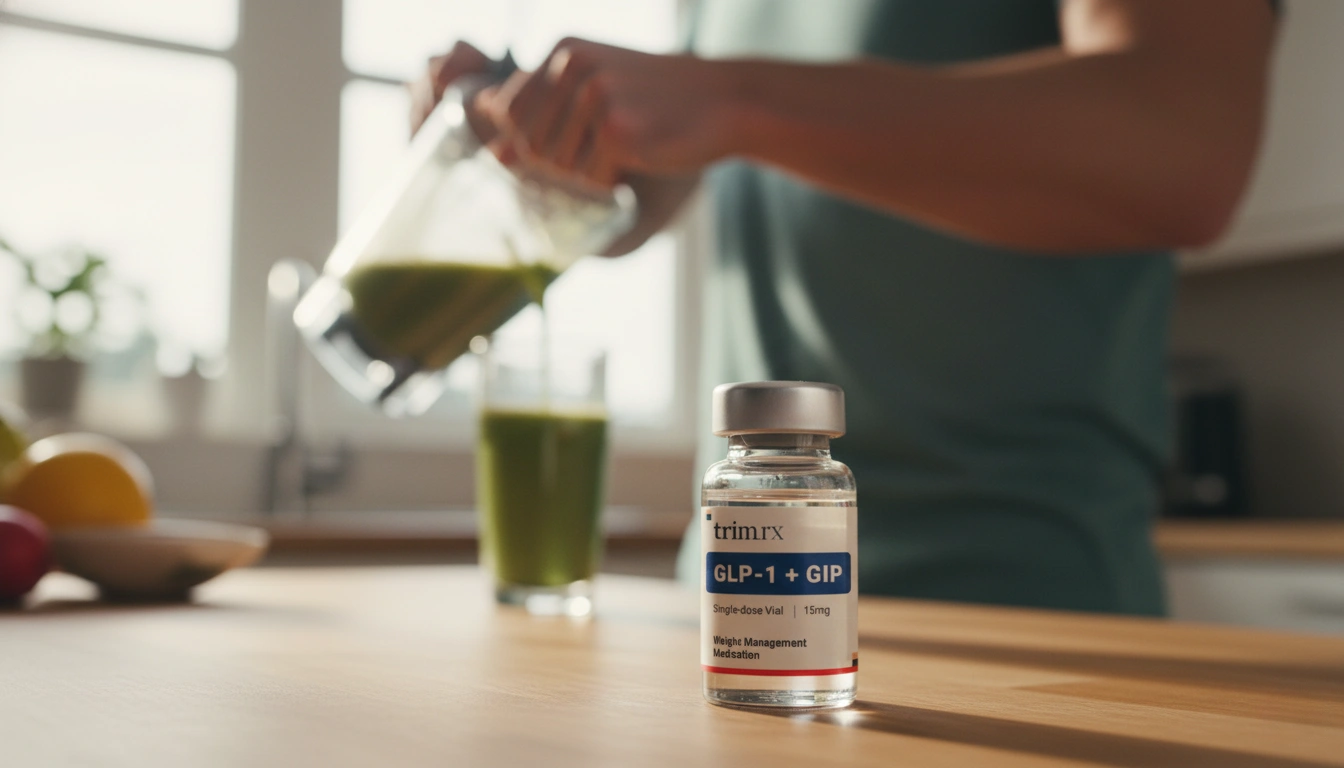Can You Get Off GLP-1? Understanding the Transition from Medication to Lifestyle

Introduction
The modern approach to weight loss has evolved dramatically, with medications like GLP-1 receptor agonists coming to the forefront. These drugs not only assist in weight reduction but also help manage conditions related to obesity, such as type 2 diabetes. However, many individuals find themselves grappling with the question of what happens when they stop taking these medications. The fear of regaining lost weight can be daunting, especially after investing time and effort into a weight loss journey.
As we delve into this topic, we aim to shed light on the physiological impacts of discontinuing GLP-1 therapy, the potential withdrawal symptoms, and the measures one can take to ensure a smooth transition. By the end of this post, you will have a clearer understanding of the strategies available to help maintain your weight loss after stopping GLP-1 medications, and how TrimRx’s personalized weight loss programs can support you in this process.
We will cover the following aspects:
- Understanding GLP-1 Medications and Their Mechanism of Action
- The Importance of a Structured Transition Plan
- Potential Withdrawal Symptoms and How to Manage Them
- Lifestyle Changes to Support Weight Maintenance
- The Role of TrimRx in Your Weight Loss Journey
- Conclusion and Key Takeaways
- Frequently Asked Questions
Let’s embark on this journey together, exploring how to navigate the complexities of discontinuing GLP-1 therapy while maintaining a healthy and sustainable weight.
Have you ever felt like your weight loss journey was a rollercoaster ride, with peaks of success followed by valleys of frustration? You’re not alone. Many of us have navigated the complex landscape of weight management, often seeking solutions that come with their own set of challenges. One such solution that has gained significant traction in recent years is the use of GLP-1 (glucagon-like peptide-1) receptor agonists, such as semaglutide and tirzepatide. These medications offer promising results, but the question remains: Can you get off GLP-1 medications without regaining weight?
In this blog post, we will explore the implications of discontinuing GLP-1 therapy, the importance of lifestyle changes, and the various strategies that can help maintain weight loss after stopping these medications. Our goal is to equip you with a comprehensive understanding of the transition from medication to a sustainable lifestyle, emphasizing TrimRx’s commitment to personalized weight loss solutions.
Understanding GLP-1 Medications and Their Mechanism of Action
GLP-1 receptor agonists, such as semaglutide (also known as Ozempic or Wegovy) and tirzepatide (Mounjaro), have revolutionized the treatment landscape for obesity and related metabolic conditions. These medications mimic the action of the natural hormone GLP-1, which is involved in several essential processes, including:
- Appetite Regulation: GLP-1 helps reduce appetite and increase feelings of fullness after meals, thereby aiding in weight loss.
- Glycemic Control: The hormone slows gastric emptying, which results in a more gradual increase in blood sugar levels following meals. This can be particularly beneficial for individuals with type 2 diabetes.
- Weight Management: By promoting satiety and reducing caloric intake, GLP-1 medications can facilitate significant weight loss, making them a valuable tool for those struggling with obesity.
While these medications are effective, they are not without their challenges. Many individuals may find themselves asking, “What happens when I stop taking GLP-1 medications?” Understanding the potential physiological and psychological effects of discontinuation is crucial in preparing for a successful transition.
The Importance of a Structured Transition Plan
Transitioning off GLP-1 medications should not be a haphazard process. Instead, it requires careful planning and consideration. Here are some key factors to keep in mind:
1. Gradual Tapering
Research indicates that abruptly stopping GLP-1 medications can lead to a resurgence of appetite and potential weight gain. Gradually tapering the dosage, under the guidance of a healthcare professional, can help mitigate these rebound effects. This approach allows your body to adjust to lower levels of GLP-1 support while you implement lifestyle changes to maintain your weight loss.
2. Professional Guidance
Working with healthcare professionals, such as those at TrimRx, can provide invaluable support during this transition. Our team can help create a personalized plan that addresses your unique needs, including dietary changes, exercise routines, and behavioral strategies that reinforce healthy habits.
3. Continuous Support
Maintaining weight loss requires ongoing encouragement and accountability. Engaging with a support network, whether through in-person meetings or virtual platforms, can make a significant difference in staying committed to your weight management goals.
Potential Withdrawal Symptoms and How to Manage Them
When individuals discontinue GLP-1 therapy, they may experience various withdrawal symptoms, which can complicate their weight maintenance efforts. Understanding these symptoms can help you prepare and manage them effectively.
Common Withdrawal Symptoms
- Increased Appetite: Without the appetite-suppressing effects of GLP-1 medications, many individuals may find themselves feeling hungrier than before. This can lead to overeating if not managed properly.
- Decreased Satiety: The feeling of fullness that was previously experienced may diminish, making it harder to control portion sizes.
- Elevated Blood Sugar Levels: Discontinuing GLP-1 medications can result in fluctuations in blood sugar, which may impact energy levels and mood.
- Weight Gain: Many individuals who stop GLP-1 therapy experience weight regain, especially if they do not implement effective lifestyle changes.
Strategies to Mitigate Withdrawal Symptoms
- Tapering Off: As previously mentioned, gradually reducing the dosage can help your body adjust and minimize sudden changes in appetite and satiety.
- Nutritional Support: Focus on a balanced diet rich in whole foods, including fruits, vegetables, lean proteins, and whole grains. This can help you feel fuller for longer and stabilize blood sugar levels.
- Regular Exercise: Incorporating regular physical activity into your routine can help manage appetite and support weight maintenance. Aim for a mix of cardiovascular exercises and strength training.
- Behavioral Changes: Engage in mindfulness practices such as meditation or journaling to address emotional eating triggers and develop healthier coping mechanisms.
Lifestyle Changes to Support Weight Maintenance
Successfully transitioning off GLP-1 medications requires a commitment to lifestyle changes that support long-term weight maintenance. Here are some strategies to consider:
1. Establishing Healthy Eating Habits
Developing a sustainable eating pattern is vital for maintaining weight loss. Here are a few tips:
- Portion Control: Be mindful of serving sizes to avoid overeating. Use smaller plates and bowls to help regulate portions.
- Mindful Eating: Pay attention to hunger cues and practice mindful eating techniques to enhance the enjoyment of meals while preventing overeating.
- Meal Planning: Plan meals ahead of time to ensure you have nutritious options readily available, reducing the temptation to resort to unhealthy choices.
2. Regular Physical Activity
Incorporating exercise into your daily routine is crucial for maintaining weight loss and overall health. Here are some ideas:
- Find Activities You Enjoy: Whether it’s dancing, cycling, or hiking, choose activities that you look forward to, making it easier to stay active.
- Set Realistic Goals: Aim for a combination of cardiovascular workouts and strength training, gradually increasing intensity and duration as you progress.
- Stay Consistent: Establish a regular exercise schedule to help reinforce healthy habits.
3. Behavioral and Emotional Support
Addressing the psychological aspects of weight management is just as important as the physical components. Consider the following:
- Seek Support: Join a weight loss support group or connect with a coach who can provide guidance and encouragement.
- Focus on Mental Health: Engage in activities that promote mental well-being, such as yoga, meditation, or journaling, to manage stress and emotional eating triggers.
The Role of TrimRx in Your Weight Loss Journey
At TrimRx, we believe that every weight loss journey is unique and deserves personalized attention. Our approach combines advanced medical science with compassionate care to help individuals achieve their weight loss goals safely and effectively. Here’s how we can support you:
- Personalized Assessment: Our free assessment quiz allows us to understand your specific needs and create a tailored treatment plan. Take our free assessment quiz here.
- Comprehensive Support: Our programs include doctor consultations, medication management, lab work, and unlimited support to ensure you have the resources you need throughout your weight loss journey.
- Quick-Access Supplements: To complement your weight loss efforts, we offer quick-access supplements like GLP-1 Daily Support and Weight Loss Boost, designed to support your overall wellness during this transition. Explore GLP-1 Daily Support and check out Weight Loss Boost.
Conclusion and Key Takeaways
Navigating the journey of discontinuing GLP-1 medications can be challenging, but with the right strategies and support, it is entirely possible to maintain your weight loss and embrace a healthier lifestyle. By understanding the potential withdrawal symptoms and implementing effective lifestyle changes, you can create a solid foundation for long-term success.
At TrimRx, we are committed to providing personalized care and innovative solutions that empower you on your weight loss journey. Remember, you don’t have to navigate this path alone—together, we can work towards achieving your health and wellness goals.
FAQ
What are GLP-1 medications, and how do they work?
GLP-1 medications, such as semaglutide and tirzepatide, mimic the action of the hormone GLP-1 in the body, helping to regulate appetite, blood sugar levels, and promote feelings of fullness after meals.
Can I stop taking GLP-1 medications abruptly?
While it is technically possible to stop taking GLP-1 medications abruptly, it is generally not recommended. Gradually tapering the dosage under professional guidance can help minimize withdrawal symptoms and prevent weight regain.
What withdrawal symptoms should I expect when stopping GLP-1 therapy?
Common withdrawal symptoms may include increased appetite, decreased satiety, elevated blood sugar levels, and potential weight gain. Working with a healthcare professional can help you manage these symptoms effectively.
How can I maintain my weight loss after stopping GLP-1 medications?
Focus on establishing sustainable eating habits, incorporating regular physical activity, and addressing emotional aspects of weight management. A personalized plan, such as those offered by TrimRx, can provide the support you need.
Where can I find more information about TrimRx’s weight loss programs?
For more details about our personalized weight loss solutions, please visit TrimRx’s website or take our free assessment quiz to get started on your journey today!

Transforming Lives, One Step at a Time
Keep reading
China’s Supreme Court Upholds Semaglutide Patent for Novo Nordisk
China’s Supreme People’s Court upholds Novo Nordisk’s semaglutide compound patent, supporting IP protection.
Over 600,000 Californians Risk Losing Access to GLP-1 Weight-Loss Drugs
California’s Medi-Cal will stop covering GLP-1 weight-loss drugs for weight-loss-only prescriptions, effective Jan. 1, 2026.
Weight-Loss Pill Approval Likely to Prompt Overhaul of Packaged Food and Fast-Food Products
FDA approval of GLP-1 weight-loss pills may prompt food makers and restaurants to shift to high-protein, smaller-portion products.



